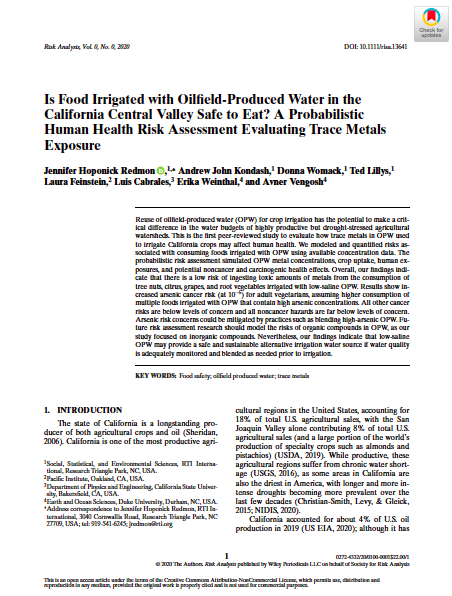Is Food Irrigated with Oilfield-Produced Water in the California Central Valley Safe to Eat? A Probabilistic Human Health Risk Assessment Evaluating Trace Metals Exposure

Is Food Irrigated with Oilfield-Produced Water in the California Central Valley Safe to Eat? A Probabilistic Human Health Risk Assessment Evaluating Trace Metals Exposure
Overview
In California, drought and a reduction in natural water availability in recent decades have led to a search for alternative water sources for agriculture. One controversial potential source is produced water a byproduct of oil extraction.
This peer‐reviewed study, produced by researchers at Duke University, RTI International, California State University-Bakersfield, and the Pacific Institute, evaluates how trace metals from inorganic compounds in produced water used to irrigate California crops may affect human health. The study indicates increased arsenic cancer risk for adult vegetarians, assuming higher consumption of multiple foods irrigated with produced water that contain high arsenic concentrations. The study finds low risk from average consumption of tree nuts, citrus, grapes, and root vegetables irrigated with produced water. It finds that other cancer risks are below levels of concern and noncancer hazards are far below levels of concern.
The study scope was limited to inorganic constituents such as sodium, boron, and naturally occurring radioactive materials. It suggests that produced water may provide a safe and sustainable alternative irrigation water source if water is blended as needed prior to irrigation and water quality is adequately monitored.
View the study here.
Key Findings
Key findings from the study include:
- There is increased arsenic cancer risk for adult vegetarians consuming food irrigated with produced water, assuming higher consumption of multiple foods irrigated with produced water that contain high arsenic concentrations.
- There is a low risk of ingesting toxic amounts of metals from the consumption of tree nuts, citrus, grapes, and root vegetables irrigated with produced water.
- Other cancer risks from the consumption of food irrigated with produced water are below levels of concern.
- Noncancer hazards from the consumption of food irrigated produced water are far below levels of concern.

